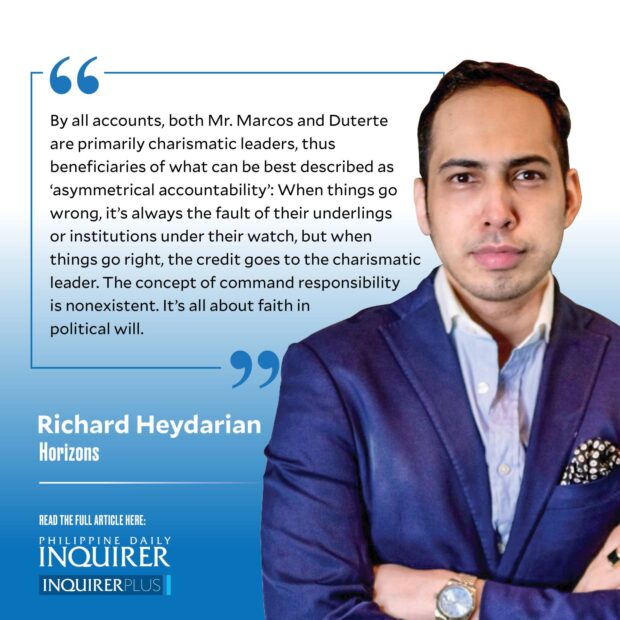Explaining the popularity of Duterte and Marcos
 When Pulse Asia released its latest approval rating for our top political leaders based on interviews with 1,200 randomly selected respondents across the country between March 15 and 19, the partisan reaction was excruciatingly predictable.
When Pulse Asia released its latest approval rating for our top political leaders based on interviews with 1,200 randomly selected respondents across the country between March 15 and 19, the partisan reaction was excruciatingly predictable.
On one hand, impresarios and diehard supporters of the House of Duterte and House of Marcos were ecstatic. Their leaders’ apparent popularity, per the survey, was taken as an unquestionable reaffirmation of their unshakable belief in the magical powers of their patrons.
Meanwhile, some supporters of the opposition reverted to a familiar playbook: shooting the messenger! Per tradition, “False Asia” began to trend anew on Twitter, the one social media platform that is not dominated by far-right influencers, who tend to be wit-shy. A familiar coterie of intellectual charlatans leaned on their art of nitpicking to expose supposed flaws in either the survey design or the very integrity of the polling agency.
Right off the bat, let me make this crystal clear, dear readers: Both sides are wrong.
To begin with, baselessly questioning the integrity of authoritative survey agencies such as Pulse Asia, which is led and staffed by folks of utmost professionalism, is deeply unethical. Mind you, mindless attacks on credible institutions—in favor of dodgy “analytics”—constitutes its own form of disinformation.
To understand the apparent popularity of President Marcos and Vice President Sara Duterte, there are three data sets and factors to keep in mind. First of all, a cursory look at the Social Weather Stations’ surveys in the post-dictatorship shows that all Filipino presidents, with the notable exception of Gloria Macapagal Arroyo, had extremely high net satisfaction ratings in their first year in office. In fact, the late President Fidel Ramos, arguably our most competent by our admittedly humble standards, started at close to +70 net satisfaction rating.
Second, the popularity of both House of Marcos and House of Duterte reflects a more fundamental structural reality, namely widespread dissatisfaction with our broken democratic institutions, which failed to uplift the vast number of Filipino people out of destitution three decades after the fall of a kleptocratic dictatorship.
After all, how on earth can we call ours a democratic system when up to 90 percent of legislative offices are dominated by political dynasties, while 40 richest families have been gobbling up the bulk of newly created growth in recent memory? Not even Latin American nations have such a comprehensive oligarchic system! Mind you: the concentration of power in the hands of dynasties was even exacerbated during reformist presidencies, with close to 80 percent of congressional seats in the hands of few families by the mid-2010s.
No wonder then, all reputable global surveys show that only a minority of Filipinos are fully committed to liberal democratic politics. To put things into perspective: A 2017 Pew Research Center survey, confirming an earlier World Values Survey in the early-2010s, showed that more than eight out of 10 Filipinos were either supportive of or open to an authoritarian system. In 2020, another Pew Survey showed that almost half of Filipino respondents said “most elected officials do not care” about the welfare of ordinary citizens.
The political scientist Adele Webb described this phenomenon as “democratic ambivalence.” I described it earlier as nothing less than “democracy fatigue,” even if we never truly had a democracy. In short, our oligarchs gave a bad name to democracy.
And this brings us to the third factor: The return of what German sociologist Max Weber described as “charismatic” leadership, namely political figures who are, in the eyes of their diehard supporters, “endowed with supernatural, superhuman, or at least specifically exceptional powers or qualities.” By all accounts, both Mr. Marcos and Duterte are primarily charismatic leaders, thus beneficiaries of what can be best described as “asymmetrical accountability”: When things go wrong, it’s always the fault of their underlings or institutions under their watch, but when things go right, the credit goes to the charismatic leader. The concept of command responsibility is nonexistent. It’s all about faith in political will.
This partly explains why our top two leaders enjoy extremely high approval ratings even if all reputable surveys show low confidence in either the presidential Cabinet or, more specifically, the Department of Education, which is run by the Vice President. In Philippine politics, subjective charisma trumps objective competence.
—————–
rheydarian@inquirer.com.ph




















